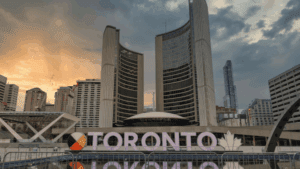A recent survey in January 2023 reports that Canadians aged 18 to 34 are the most likely to buy a home in the next 12 months. Forty-three percent of the same respondents wanted to buy a home within five years.
Several challenges and barriers impact these groups and others. They include high interest rates, difficulty saving for a down payment, and economic uncertainty. However, some excellent solutions can help Canadians overcome these obstacles to home ownership.
Identifying Barriers to Homeownership
Understanding how to overcome these barriers means identifying them first. Research by RE/MAX has identified some of the most significant issues.
High-Interest Rates Plus Inflation
A complete 44% of the people who responded to a company survey pegged high interest as the biggest obstacle. Rising interest rates have increased the cost of borrowing, making mortgages expensive. High interest rates are responses to rising inflation.
Wealth Distribution
Statistics Canada highlights uneven wealth distribution and income across generations as another barrier to home ownership. Their findings point to the fact that lower-income earners had a higher debt-to-income ratio, one of the factors traditional banks use to approve mortgages.
Lack of Savings
Reports highlight the increased cost of living as one of the big culprits. For example, as far back as 2022, the rising price of food staples was a big concern, according to Statistics Canada. That spills over into approximately 56% of Canadians concerned about affording rent and housing.
These barriers and others are well noted and documented. Governments are addressing these issues.
Financial Assistance and Programs for Buyers
The Canadian government has various incentives and programs to help first-time buyers and others.
The GST/HST New Housing Rebate
This program is for people who have purchased a brand-new or renovated house from a builder. Some of the money paid in GST/HST is eligible for a rebate.
First Home Savings Account (FHSA)
This government program allows first-time home buyers to save tax-free up to a certain limit. For example, the FSHA allows for $8,000 in contributions if they were made by December 31st.
The Ontario government also offers several first-time home buyer programs. It’s important to remember that, except in a few exceptions, you cannot have owned a home before to qualify for these.
Ontario Land Transfer Tax Refund
If you’re a first-time buyer who meets the qualifications, you might be eligible for a refund of this tax. Generally, it’s part of the closing costs, and to qualify, you need to be a permanent resident or Canadian citizen. With this refund, home buyers won’t pay any tax if their home is less than $368,000.
Several Ontario municipalities run programs, too.
- An affordable homeownership program in Chatham Kent, offers 10% of the purchase price to people with a gross household income of $95,000 or under.
- Simcoe County also has a program that will supply 10% of the purchase price that can be put towards a down payment. If you live in the house for 20 years, that part of the loan is forgiven.
It’s important to remember that the mortgage rules in Canada require a 5% down payment on any property worth less than $500,000.
Strategies for Overcoming Personal and Market Challenges
If you’re struggling to get the keys to your home, you can take some initiative.
- You can get a good idea of your situation by using a mortgage calculator specifically designed for first-time home buyers. MoneySense has an excellent list of tools that can help you get started.
- Getting pre-approved can help you lock down the amount you’ll have to work with. This is an excellent way to lock in an interest rate for up to 120 days. It’s a written contract between a lender and the applicant.
Once the numbers are clarified, you can strategically determine where to purchase property to effectively address personal and market challenges. Remember that homes in urban areas are smaller but often more expensive.
There are other resources for people looking to break into the housing market.
Resources and Support Systems for Potential Homeowners
There are several non-profit organizations and other resources to help potential homeowners put together down payments and get homes.
Trillium Housing Non-Profit Corporation
This company can help low-income families put together down payments for their homes. The loans remain interest-free until the property undergoes transfer or sale.
Habitat for Humanity Greater Toronto Area (GTA)
This group actively empowers families by constructing quality, affordable homes, with the involvement of community partners and volunteers throughout the process. This is a non-profit housing corporation that mobilizes communities to help lower-income working families.
People finding it challenging to enter the housing market can take advantage of different types of help with the down payment and interest-free loans. Affordability is one of the biggest challenges to home ownership in places like Ontario. The high cost of housing and the spike in interest rates have been peaking for some time. RBC Thought Leadership provides a final insight. They see opportunities opening up in the later stages of 2024 or into 2025 as interest rates drop.
Looking for Private Loans and Mortgages?
Mortgage Broker Store focuses on numerous mortgage-related products. One of our priorities is mortgages that don’t meet traditional lending institution requirements. Our team includes private lenders, brokers, and authorized mortgage agents. Let us help you prepare for and get a product that meets your requirements. Email ron@mortgagebrokerstore.com or call 416-499-2122.



